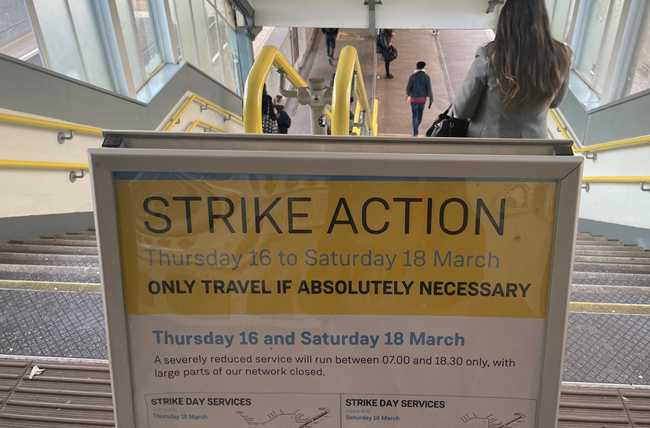Being instructed not to travel when trains are disrupted but still running can confuse and frustrate passengers, the transport watchdog has warned.
Transport Focus has published new research ahead of a furthere wave of strike action by rail unions. RMT union members will strike on Saturday 26 August and Saturday 2 September, while members of drivers’ union ASLEF will walk out for 24 hours on Friday 1 September.
A number of rail companies have warned customers against travelling. South Western Railway said that for both 1 and 2 September it is advising customers ‘to only travel if their journeys are absolutely necessary’ and that if customers ‘must’ travel, they ‘should’ check their entire journey.

A South Western Railway sign discouraging customers from using its services
Transport Focus found that passengers’ reactions to ‘do not travel’ messages due to major disruption, extreme weather and flooding for example, differed depending on the timing and language used. ‘Many passengers struggled with the whole notion that the railway runs trains but tells people not to use them,’ the watchdog said.
In the foreword to the report, chief executive Anthony Smith wrote: ‘Reactions range from baffling (not how a normal business would behave), to frustrating (being told not to use a train that is in fact running) and irritating (a sense that the railway has no right to tell people, in effect, to stay at home).
‘The industry must never lose sight of the fact it exists for people to travel and telling them not to do so must be an absolute last resort.’
Under the current post-pandemic franchise model, the revenue risk from fewer passengers has transferred from train operators to the taxpayer.
As well as the most appropriate way to communicate, passengers were asked what they understood existing ‘do not travel’ messages to mean, and if they provided the right information to make informed decisions about their journey.
The research found that passengers are ‘naturally more sympathetic to some reasons for disruption than to others’ with strikes and staff shortages at the ‘less sympathetic’ end of the spectrum, on the grounds that operators ‘Should be able to negotiate or hire more staff’.
Jason Webb, customer information director and Rail Delivery Group lead for the Smarter Information, Smarter Journeys (SISJ) Programme, which jointly commission the research, said:
‘The research delivered new insight into how customers react to information during severe disruption. Following the research, the SISJ Programme has worked with train operators to develop and implement best practice to be used when communicating Do Not Travel messages.’
Key findings
• Passengers feel that the standard messaging is largely clear, but it needs to be in plain English and avoid technical terminology.
• Saying ‘do not travel’ when trains are running can confuse and frustrate passengers.
• Some passengers will always try to make a journey in the face of disruption – they tend to feel that their journey is not ‘deferrable’.
• The information passengers require varies depending on where they are in their journey - have they started out or are they still close to home.
Register now for full access
Register just once to get unrestricted, real-time coverage of the issues and challenges facing UK transport and highways engineers.
Full website content includes the latest news, exclusive commentary from leading industry figures and detailed topical analysis of the highways, transportation, environment and place-shaping sectors.
Use the link below to register your details for full, free access.
Already a registered? Login